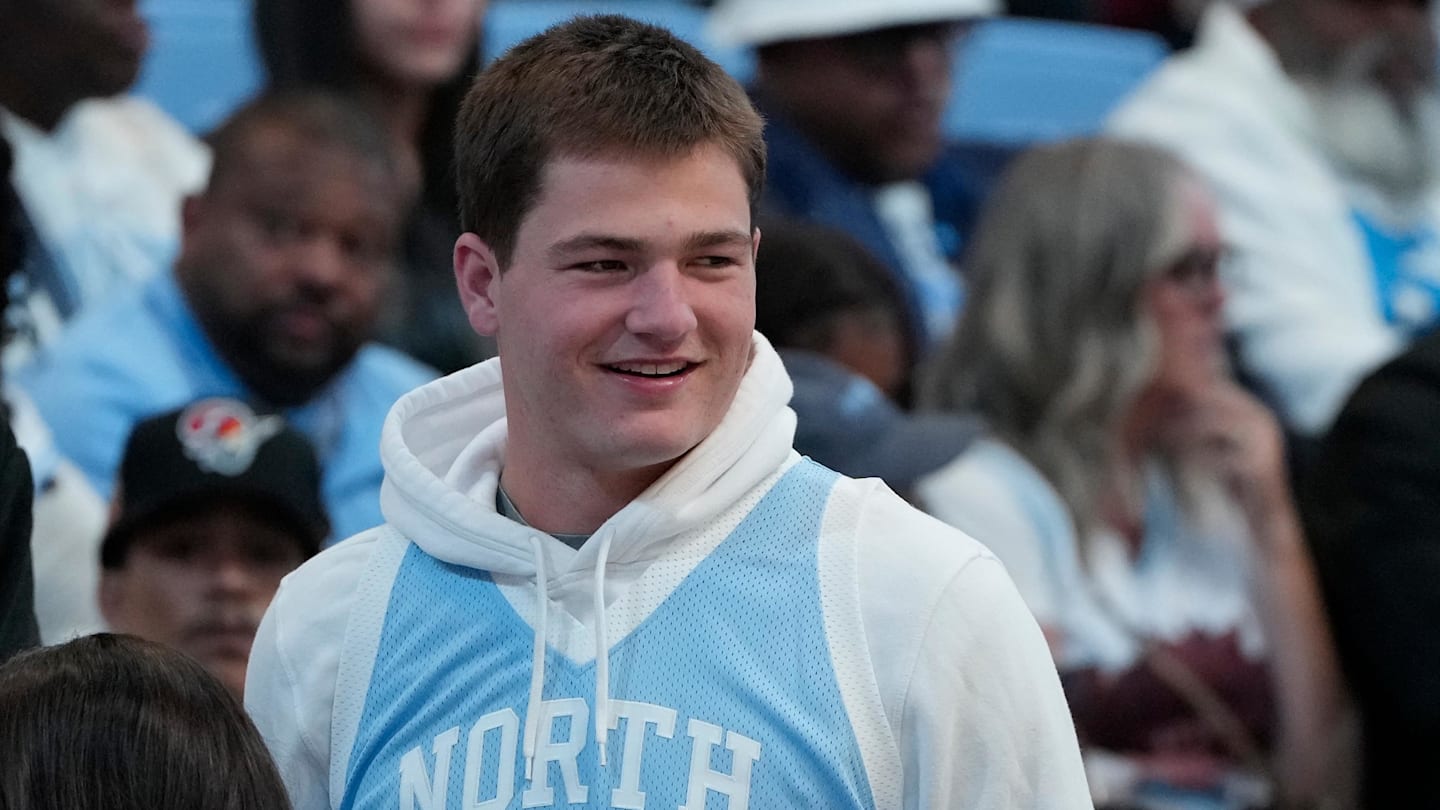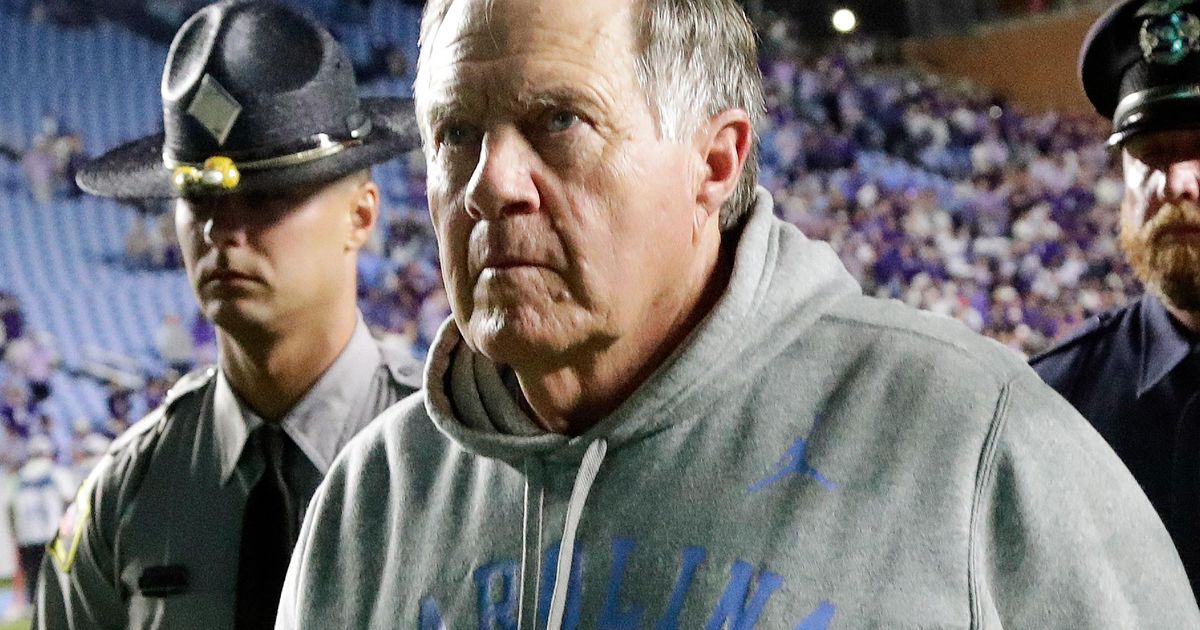Forty names, games, teams and minutiae making news in college football, where Rick Neuheisel’s proud dad exultation over the play-calling debut of son Jerry was one of the weekend’s best moments. First Quarter: When Your Top Five Team Turns Into a Dumpster Fire. Second Quarter: Ultimate Carousel Chaos Theory.
Assessing the work done to date by coaches in new places. The two extremes are pretty obvious thus far.
The worst: Bill Belichick (21), North Carolina
With an 0–3 record against power-conference opponents and an average losing margin of 29 points, one thing has become clear—Belichick and his posse arrived with maximum hubris and minimum respect for the college competition.
Putting together a Sun Belt roster and calling it the “NFL’s 33rd team” was a gross miscalculation. Assembling a staff dotted with friends and relatives hasn’t worked, either. (If the idea was to set up his defensive coordinator son Steve as successor-in-waiting, giving up 28 points in the first quarter to Clemson isn’t going to get it done. Neither is fielding a unit that is last in the ACC against power-conference offenses at 6.71 yards allowed per play.)
SI College Football Newsletter. Get SI’s College Football Newsletter. dark. FREE
There might be a couple of wins left on a soft ACC schedule (no Miami, Louisville or Florida State), but a bowl game is unlikely. As for 2026: The recruiting class for next year should be better—but how much can high school players help immediately? Carolina will have to crush the portal, which would necessitate a change from the approach that brought together this season’s overmatched roster.
After all the buildup, Blowout Bill has watched the Kenan Stadium stands empty in the third quarter twice, against TCU in the opener and Clemson on Saturday. If the fans have already lost interest, the next question is whether Belichick will.
Ooof. pic.twitter.com/yK8UQvP7FV
— Bryan Fischer (@BryanDFischer) October 4, 2025
The best: Dan Mullen (22), UNLV
The former coach at Florida and Mississippi State is 5–0 in Vegas. That’s the Rebels’ best start since 1974, when this was a Division II program. (Something The Dash has never seen before: That ’74 UNLV team played 10 consecutive home games from Sept. 28 through Nov. 30.)
The competition has been soft in this 5–0 start, but beating UCLA looks better today than it did last week. The rebuilt Rebels, who had just five returning starters, have been winning in the margins—they’re tied for the national lead in takeaways with 13, and blocked two punts for touchdowns against Wyoming on Saturday. They’ve also been much better on third down than their opponents, converting 49% of the time and allowing a 22% conversion rate.
Mullen won a lot of games in the SEC, so landing him at UNLV after a stint in the TV analyst chair was a coup. The challenge might be keeping him. Barry Odom elevated the program but left after two seasons; the Rebels would greatly benefit from some coaching continuity.
Other first-year coaches between Mullen and Belichick, in descending order of happiness:
Jake Dickert (23), Wake Forest
This was a cleanup-on-aisle-seven job, and Dickert is doing good work with the mop. Dave Clawson was a great coach but not really built for the modern world, at a school with high academic standards and a small donor base. Still, Wake is hanging in there at 3–2, and should be competitive the rest of the way.
Expectations were lowered after opening with a one-point win over Kennesaw State. Since then, the Demon Deacons have improved considerably. They were competitive against NC State, had undefeated Georgia Tech all but beaten before losing in overtime, then won at Virginia Tech. Retaining running back Demond Claiborne and safety Nick Andersen was big, and well-traveled transfer quarterback Robby Ashford is playing the best ball of his career.
K.C. Keeler (24), Temple
Here is the ultimate turnaround stat: The 3–2 Owls are the only team in the nation not to lose a turnover thus far, after having 94 of them in 48 games from 2021 to ’24. The most careless team in the country has become the most fastidious.
The 66-year-old Keeler got back to his northeast roots after 11 highly successful seasons in Texas at Sam Houston State. Prior to that he’d been at Delaware and Division III Rowan, winning at both stops. This was a common-sense hire at a school that had tried about everything and whiffed on most of them. He should have Temple in contention for its first bowl bid since 2019.
Matt Entz (25), Fresno State
Another product of the North Dakota State pipeline, Entz won two FCS national titles there and then spent last year as an assistant at USC. Fresno grabbed him, and the result has been a 5–1 start.
Entz has blended transfers from a variety of levels—power-conference programs, elsewhere within the Mountain West, FCS—with holdover players and found ways to win games. Total margin of victory in the Bulldogs’ 2–0 MWC start: five points.
Barry Odom (26), Purdue
Like last season, the Boilermakers are winless to date against power-conference opponents. Unlike last season, they are not hopeless against that level of competition.
At 2–3, Purdue was fairly competitive against USC, Notre Dame and Illinois before losing by an average of 19 points. A 100-yard kickoff return by the Fighting Irish and a 70-yard interception return by the Trojans helped break those games open. The month of October provides the Boilers their best opportunities to earn their first Big Ten victory since 2023 before closing with a gauntlet in November.
Charles Huff (27), Southern Mississippi
Huff’s strange parting with Marshall has gone better for him than for the Thundering Herd. After portaling a lot of his old roster with him, Southern Miss is off to a 3–2 start—not spectacular, but after the Golden Eagles had dropped 13 straight games to FBS competition, this is tangible progress. Meanwhile, Marshall is 2–3 and took three games to get its best quarterback in the starting lineup.
Frank Reich (28), Stanford
Give the interim coach credit for this much: His team hung together after an 0–2 start to what looked like a hopeless season. The Cardinal (2–3) shut out Boston College in the second half to win their first ACC game, then rallied to beat San Jose State. Sticking with quarterback Ben Gulbranson after the first two games proved to be the prescient, patient decision.
Scott Frost (29), Central Florida
The Knights’ 3–0 start to Frost 2.0 is now 3–2, with a sweep from the Sunflower State. UCF gave up 6.2 yards per play to Kansas State and 6.14 to Kansas, and quarterback Tayven Jackson’s productivity has been waning. With four tough Big 12 road games still to come, bowl eligibility is not assured.
Rich Rodriguez (30), West Virginia
At least he won the Backyard Brawl. That’s really all Mountaineers fans can say about RichRod 2.0 so far, as a season that figured to be a struggle is delivering on that expectation. An injury to quarterback Nicco Marchiol, coupled with an increasingly porous defense, has led to three noncompetitive defeats in three Big 12 games. And then there was that nonconference loss to Ohio. Fortunately for West Virginia, Oklahoma State is around to finish last in the league. Unfortunately for West Virginia, it doesn’t play the Cowboys.
More College Football on Sports Illustrated
Listen to SI’s new college sports podcast, Others Receiving Votes, below or on Apple and Spotify. Watch the show on SI’s YouTube channel.


